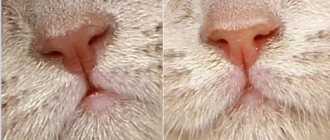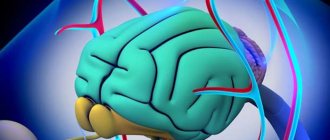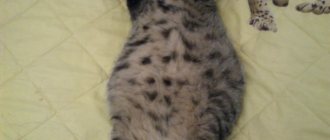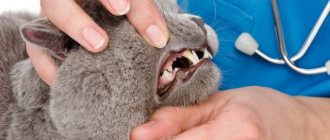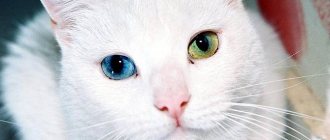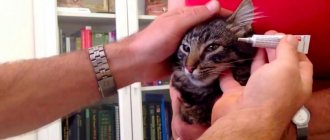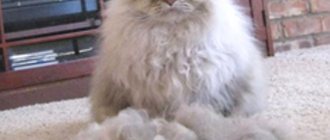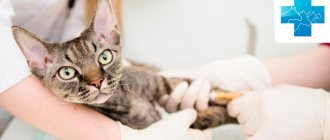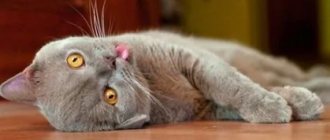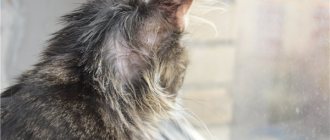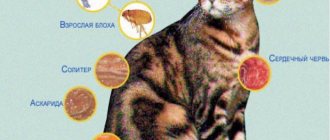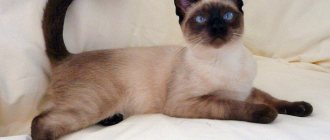Saliva in cats is important for the normal functioning of the body. It protects teeth and oral mucosa from damage, helps in the processes of chewing and swallowing food. But when a cat drools quite profusely, then this is a sign that something is wrong with the pet. Increased salivation in a cat is a sign of ill health and malaise in the pet. In this article you can find out the answer to the questions why this happens and what needs to be done about it.
Normal salivary processes
A cat's salivation can be a natural occurrence. This liquid protects the gums, teeth, and oral mucosa from damage. It facilitates chewing food, swallowing processes, has a bactericidal effect and performs other functions. Saliva contains lysozyme, which accelerates tissue regeneration and has an anti-inflammatory effect.
Salivation should not be a concern in the following cases:
- while eating food;
- if the animal smells or sees food;
- while chewing food;
- with severe nervous stress;
- when taking bitter medications (for worms, no-shpa and others).
Salivation increases slightly if the cat is healthy. You can see saliva on the fur near the mouth. If there is a large volume of saliva or its release for more than 10-15 minutes, the owner of the animal should be concerned.
Doctors refer to the process of salivation as “salivation.” Do not be alarmed if your doctor diagnoses ptyalism or hypersalivation. These terms simply mean that the animal is drooling more than usual from its mouth.
Why does a cat's mouth drool? List of reasons
Salivation (salivation) is a natural physiological process and should not cause discomfort to the owner or the animal itself. If you notice this in your pet, then you need to find out the reason why your cat is drooling from its mouth. When a cat begins to drool profusely, it causes some inconvenience, but this can be a symptom of a wide variety of diseases.
Why does a pet need saliva?
The role of saliva in the body is quite significant. It moistens the food, which allows it to move further down the esophagus. It protects teeth and gums from damage, and also allows the cat to carry out daily hygiene of its fur.
Saliva is secreted by the salivary glands throughout the day. It is secreted especially abundantly during hunger, eating, licking and when communicating with its beloved owner.
Saliva contains enzymes that break down carbohydrates, as well as calcium, which is used to strengthen tooth enamel.
Signs of hypersalivation (excessive salivation)
- The fur around the muzzle is damp and matted into icicles.
- Small wet spots remain in the place where the cat slept
- Saliva openly flows from the cat's mouth
Oral diseases
These include:
- Caries
- Gingivitis
- Tartar
- Periodontal disease
- Flux
- Mouth ulcers
- Broken edges of teeth
And this is not a complete list of cat dental diseases. In addition to hypersalivation, there is a loss of appetite (in fact, the cat has an appetite, but she cannot eat because of bad teeth), and bad breath. And upon examination, even with the naked eye, dental problems will be visible, for example, red gums, tartar and other damage.
Digestive diseases
Most often, hypersalivation is accompanied by acute gastritis and duodenitis. The disease is accompanied by a bitter odor from the mouth, frequent vomiting and loss of appetite (here she really doesn’t want to eat).
Gastritis and duodenitis are treated with diet therapy - special food for diseases of the digestive tract, but only after visiting a veterinarian!
Hypersalivation occurs with the following viral diseases
- Calcivirosis
- Panlekopenia in cats
With all viral diseases, except rabies, cats' temperature rises significantly, they are lethargic, apathetic, and lack of coordination develops. Without timely treatment, the animal risks dying.
Poisoning
Cats drool when they are poisoned. She can be poisoned:
- Fermented food
- Indoor plants
- Antifreeze
- Detergents
- Catch a mouse poisoned with rat poison
- Drugs
- Rotten meat
Symptoms of poisoning
- Drinks a lot of food
- Apathy
- Refusal to eat
- Rarely or often visits the litter box
- Impaired motor coordination
- Temperature drop
In case of poisoning, all organs without exception are affected, but primarily the kidneys and liver. Acute kidney and liver failure develop, which provokes the rapid death of the pet.
Rat poison increases vascular permeability, blood cells leave the veins, arteries and capillaries. Significant hemorrhages appear on the skin and internal organs. The process can only be stopped by a quick infusion of hemostatic drugs.
Diseases of the salivary glands
These include:
- Inflammation
- Rebirth
- Cysts
- Tumors
In any case, the gland enlarges and it becomes possible to palpate it. A detailed study of diseases of these small organs is carried out within the walls of a veterinary clinic, namely, smears are taken for research and pieces of the gland itself.
Causes of excessive salivation
Before treating your pet, you need to understand the reasons for the secretion of excessive saliva. You should find the irritant and find out the nature of its action. The culprits of increased saliva production can be different - from damage in the digestive tract and oral cavity to viral diseases.
The most common reasons are:
- Hygiene procedures. Cats are very clean and often lick themselves. During this process, additional saliva is released.
- Hairballs in the stomach. When licking, the fur enters the stomach, and over time an impressive lump accumulates in it. It can only be burped with additional saliva.
- Poisoning. Cats are predators who love to hunt, and the prey they catch is not always safe or healthy. Poisoning can also be caused by other poor quality food.
- Allergy. This occurs especially often when changing food. If during adaptation there is excessive salivation, vomiting and nausea are observed, then poisoning or allergies are possible.
- Foreign body in the esophagus or throat. Pieces of food and other objects that are not completely swallowed often cause salivation.
- Damage to the oral cavity and their consequences. Neoplasms, ulcers, enamel damage, wounds of the lips and cheeks cause salivation.
- Oncology, viral diseases.
Rabies is one of the most terrible causes of excessive salivation. Hypersalivation is considered a characteristic sign of this disease. In addition, a cat may be afraid of light, be overly affectionate, or, conversely, aggressive. Appetite changes and other symptoms appear. Rabies is incurable, but it is difficult for cats living in apartments to become infected with it. If an animal is released outside, its health can be maintained through vaccinations.
Diagnostics
If your cat has excessive salivation, an unpleasant odor from the oral cavity, or constantly sticks out his tongue, then you need to undergo the necessary diagnostics in order to then begin effective treatment:
- The veterinarian will first carefully examine the oral cavity for the presence of any foreign bodies.
- Then you need to examine your tongue and teeth. Are there any inflammatory processes, wounds or chips?
- To rule out a foreign body stuck in the esophagus, you need to do an x-ray and ultrasound.
- A blood and stool test will help determine the presence of helminths in the body.
- A urine test will help identify disorders in the genitourinary system.
Symptoms and signs
Increased saliva production is accompanied by other physiological changes. It's easy to spot them:
- Cats lose their appetite. This happens with diseases of the gastrointestinal system and viral diseases. It is worth being wary and visiting a doctor if the animal refuses food, but saliva is released profusely.
- Pets refuse solid food. This is observed in cases of problems with the digestive tract, oral cavity, and teeth. The cat refuses solid food, although she previously ate it with pleasure. The animal often holds its head in an unusual way, and food may fall out of its mouth.
- Your pet's behavior changes. Cats experience discomfort when they are sick. As a result, they can be aggressive and irritable.
- Vomiting and nausea are observed. These signs may indicate serious illness in your pet.
- The cat has difficulty swallowing. As a result, her behavior also changes.
- The animal has an unpleasant odor coming from its mouth.
- The cat often rubs its face with its paw. This is a sign that she is experiencing discomfort or pain in her mouth.
- Various neurological symptoms are observed. Having understood the causes of excessive salivation, symptoms of ailments and possible consequences, you can begin treatment. You have to figure out how to do this.
Types of hypersalivation
There are two types of drooling - normal and pathological. The first condition is a non-hazardous phenomenon caused by physiological characteristics. The second, on the contrary, is caused by diseases, including fatal ones.
Regular
The animal can thus show its owner its affectionate attitude. When stroked, the cat purrs, and saliva begins to leak from the pet's mouth. This situation especially often occurs with sphinxes and other breeds that have an elongated muzzle.
Foreign objects stuck in teeth, gums, and soft tissues can cause hypersalivation. This is revealed during examination of the oral cavity. The pet will make every effort to cope with this problem, but sometimes it cannot solve such a problem on its own.
Cats are distinguished by their curiosity, which nature has generously endowed them with. They may eat an insect or plant even if it is poisonous or tastes bad. This can also cause drooling. If the condition is accompanied by diarrhea and vomiting, you must contact a veterinary clinic as soon as possible.
Question to the expert
Is it true that cats sense dangerous or poisonous food?
Cats' ability to sense or taste poisonous plants or inedible food has been greatly exaggerated. It is worth keeping potentially dangerous flowers, chemicals and even spoiled food away from your pet - cats are attracted to strong pungent odors, and besides, their curiosity can play a cruel joke.
Another reason for natural hypersalivation is motion sickness of the animal. Sometimes, during a long trip, the cat may also suffer from this problem, which manifests itself in increased salivation, which will disappear after the end of the trip.
Pathological
This condition requires prompt veterinary intervention. It manifests itself in a number of ways:
- hypersalivation occurs regardless of external factors, as with normal salivation;
- the volume of saliva is constantly increasing;
- bouts of salivation last more than two hours;
- there are other symptoms of diseases.
If there are one or more factors, it is important to seek veterinarian advice as soon as you can.
Treatment
If there is excessive salivation, you should contact a veterinarian. You should not treat your cat yourself. Only a doctor can make a correct diagnosis. The causes of excessive salivation were listed above, and depending on them, treatment will be prescribed.
A medical professional will examine your cat. After the examination, he will be able to determine exactly why the animal is salivating and what to do next. If a foreign object is found in the mouth, esophagus, or pharynx, the doctor will remove it. It is very difficult to do this at home.
If any diseases are detected, the doctor will prescribe a course of treatment. He will give recommendations on how to carry it out with the greatest effect. The doctor will also advise methods of rehabilitation for the cat after treatment.
Tips for keeping your pet safe
A few tips will help you avoid the problem of abnormal salivation and related ailments. Compliance with them allows you to normalize the production of saliva in the animal:
- all drugs and products hazardous to the cat’s health must be kept out of her reach;
- after the problem manifests itself, you need to give your pet more fluid to avoid dehydration and normalize metabolism;
- new food should be introduced into the diet gradually, starting exclusively with liquid food;
- measures should be taken to alleviate the animal’s condition and eliminate relapses by carefully monitoring the cat’s menu;
- the animal does not need to be given bony fish and other food with small hard pieces;
- if damage is detected in the oral cavity, they should be promptly treated with disinfectant compounds;
- When treating fur from ticks and fleas, you need to put a bandage on the cat's neck that will prevent her from licking the drug.
If the doctor’s recommendations are followed and after all the measures salivation returns to normal, then the pet is on the mend. In the future, you need to try to eliminate situations that will harm the cat’s health.
Bottom line
Cat drooling is a fairly common occurrence, but usually not life-threatening. Often this problem appears due to the curiosity of animals and the inattention of their owners. Contacting a medical specialist will solve all the issues and cope with the problem of excessive salivation.
The cat owner is required to be attentive and take good care of the pet. During the period of illness, the animal suffers, so it needs not only treatment, but also care and love. This costs nothing to a person, but it helps a lot for a sick pet.
Prevention measures
To avoid excessive drooling due to pathological problems, there are some preventive measures:
- comply with mandatory vaccination requirements;
- minimize the possibility of contact between a pet and street animals;
- maintain a proper balanced diet;
- ensure the freshness of your cat’s food;
- regularly examine your pet; if unusual manifestations are detected on the skin or mucous membranes, you should seek help from a veterinarian;
- block the cat’s access to poisonous plants, medicines, and household chemicals;
- Brush the coat regularly; for fluffy breeds, use a furminator.
To prevent the formation of bezoars, there is a special paste that should be given to your pet periodically with food. It facilitates the removal of hair from the digestive tract.
All measures to prevent hypersalivation are quite simple. They do not require much effort or financial costs, but help to avoid serious health problems for your pet, and therefore prolong its life.
